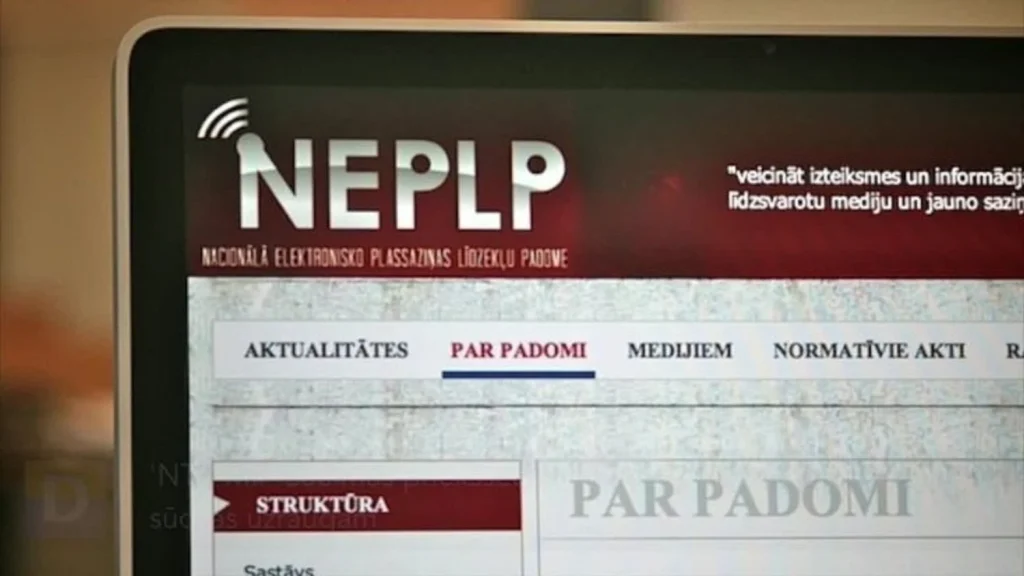Listen to the article
Latvia’s media regulator has restricted access to 27 more websites that it says are spreading Russian propaganda and disinformation, marking another step in the Baltic nation’s ongoing efforts to counter Russian information warfare.
The National Electronic Mass Media Council of Latvia (NEPLP) announced the decision through an official publication in Latvijas Vēstnesis, as reported by Delfi. The move comes after Latvia’s State Security Service (VDD) requested an investigation into numerous websites including gra.ru, donnews.ru, fedpress.ru, lentv24.ru, gazetacrimea.ru, kazachestvo.ru, bashinform.ru, and media73.ru.
According to the NEPLP’s investigation, these websites systematically disseminate one-sided and biased information regarding Russia’s war against Ukraine. Officials determined that the platforms provide informational support to Russian military personnel while creating a positive image of Russia and justifying the occupation of Ukrainian territories.
“The activities of these resources negatively affect the unity of Latvian society, interethnic relations, and can undermine support for Ukraine in its struggle for independence, sovereignty, and territorial integrity,” the NEPLP stated in its announcement.
Latvia, which shares a border with Russia and has a significant Russian-speaking minority population, has been particularly vigilant about Russian influence operations since the full-scale invasion of Ukraine began in 2022. This latest blocking action represents just one in a series of similar decisions by Latvian authorities to restrict media sources they deem to be spreading Kremlin narratives.
The Baltic states have been at the forefront of European efforts to counter Russian disinformation campaigns. Latvia, Estonia, and Lithuania have experienced Russian information operations firsthand over many years and have developed some of the most robust responses within the European Union.
Media experts note that these Russian-backed websites often blend factual reporting with subtle propaganda elements, making them particularly effective at influencing public opinion. Many target Russian-speaking populations in neighboring countries, attempting to create divisions within these societies and undermine support for Ukraine.
The blocked websites represent various regional Russian news outlets and specialized information portals. Several focus on specific regions or constituencies, such as Crimea (gazetacrimea.ru) or Cossack communities (kazachestvo.ru), which analysts say allows them to target particular demographic and cultural groups with tailored messaging.
Latvia’s approach reflects broader concerns across the EU about information security. The European Commission has strengthened its regulations against disinformation through the Digital Services Act, which requires major online platforms to address risks related to the dissemination of disinformation.
Critics of such blocking measures occasionally raise concerns about potential overreach and freedom of expression implications. However, Latvian officials have consistently maintained that their actions are necessary security measures rather than censorship, pointing to evidence of coordinated information campaigns aimed at destabilizing democratic societies.
The NEPLP’s decision aligns with Latvia’s broader security strategy, which has included increasing defense spending, supporting NATO initiatives, and advocating for stronger European responses to Russian aggression. Latvia has been among Ukraine’s strongest supporters since the war began, providing both military and humanitarian assistance.
The regulatory body emphasized that its decisions are based on thorough investigations and are aimed specifically at sources that systematically spread false narratives that could harm national security and social cohesion.
Internet service providers in Latvia will now be required to implement technical measures to restrict access to these websites within the country’s territory.
Fact Checker
Verify the accuracy of this article using The Disinformation Commission analysis and real-time sources.




9 Comments
While freedom of speech is important, I believe Latvia is justified in restricting access to websites that are blatantly spreading Russian propaganda and supporting the invasion of Ukraine. Protecting national security and democratic values should take precedence.
This is a concerning trend, but Latvia seems to be taking appropriate action to limit the influence of Russian state media in its information space. Restricting access to known propaganda outlets is a reasonable step to uphold national security and sovereignty.
Agreed. Preventing the amplification of Russian state narratives is crucial, especially for countries bordering Russia. Latvia has a responsibility to shield its citizens from this kind of coordinated disinformation campaign.
Interesting move by Latvia to counter Russian disinformation and propaganda. It’s important for countries to take a firm stance against the spread of false narratives, especially during conflicts. Fact-checking and media literacy are key to protecting democratic discourse.
It’s encouraging to see Latvia taking decisive action to limit the spread of Russian disinformation. Unchecked propaganda can have corrosive effects on public discourse and social cohesion. Kudos to Latvia for defending its democratic institutions.
It’s good to see Latvia taking a proactive stance against Russian propaganda. Disinformation can have serious consequences, especially in border regions. I hope other countries in the region follow suit to counter these malign influence operations.
This is a complex issue, balancing free expression and national security. But Latvia seems to have a compelling case for restricting access to these propaganda websites. Disinformation can be a serious threat, especially during wartime.
Latvia’s actions demonstrate a commitment to media integrity and public discourse. Countering state-sponsored disinformation is crucial, especially amid an ongoing conflict. I hope this sets an example for other nations grappling with similar challenges.
Absolutely. Maintaining an informed and resilient citizenry is vital for any democracy. Latvia is taking a responsible approach to safeguarding its information space from foreign manipulation.